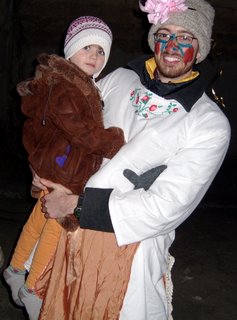There's a factory in my village, and ever since I learned of it's
existence I've been meaning to stop by for a tour. As the largest
employer in the village with 500 workers, it's pretty important that
I at least have a basic knowledge of what goes on there. I've put it
off until a couple days ago, largely because I had heard that the
director of the factory did not allow such things and I didn't want
to be rejected. He's certainly within his rights here, but it's not
exactly the warm welcome I would want. I had asked one of my friends
in the mayor's office to take me, thinking that he might be able to
facilitate something, but just like I had asked him to take me to the
two schools, the hospital, and the farm association those requests
are always delayed and delayed. So, as I've done with the other
organizations, I went alone and hoped that by playing the "American
card" I'd get a look inside.
[Just bear in mind how strange this is. Imagine going up to a school
or hospital or factory where you've never been and no one knows you
and asking if you can spend the day there or meet with the director
or get a tour. People would think you're crazy! Now imagine a
foreigner who only speaks broken English doing this in America. It
would be strange, to say the least. Well, this is similar to the
situation in which I often find myself, but it seems the only
effective way to really meet people and understand things - you just
have to jump in.]
I schmooze with one of the guards at the gate, who turns out to be
the father of a girl I know, so he agrees to give me a visitor pass
[this, in and of itself impressed me - I was not expecting to ever
see an official looking "Visitor Pass" that clips onto my shirt]. I
get inside and meet the vice-director, Sergeiz who only speaks
Turkish - the factory is owned by Turks - and the director, Anatoli
who turns out lives across the street from me.
They have lots of questions for me about American foreign policy,
which are always tricky questions for PCVs to answer (or avoid), both
because of the difficult words such conversations require and because
it seems the foreign policy for which America is known runs
countercurrent to the Peace Corps goals of world peace and friendship
- and PCVs throughout the world have a difficult enough time
convincing locals that they're not spies and actually chose to come
live here. Fortunately, all three of us have generally the same view
of what American policy should be, so the conversation goes
smoothly. I show them pictures on my laptop and they offer me tea
and coffee.
I was under the impression that this factory made blankets or socks
or something that was sold domestically in Moldova. So I ask what
exactly they make, and Sergeiz leaves and returns with a light blue
Old Navy women's tank top! They go on to say that they also make
some t-shirts for Banana Republic, which I later see during a tour of
the facility. I tell them that when I was a college student I worked
an a Banana Republic store - who knows, maybe I sold something they
made. We all have a good chuckle.
Anatoli gives me a tour of the place and I see where the workers sit
and sew. There are two floors and two daily shifts and in the
basement are boxes of finished products with addresses for New York
and Tennessee that are shipped out each week. The whole factory
basically makes these light tank tops, each section of the factory
sewing a different color.
I decided to press my luck and ask if I could take a picture of where
people work, which was politely refused - I think he's worried I'm
going to report poor working conditions to someone. I think when
they first opened the factory 3 or 4 years ago there were some health
problems that have since been taken care of. And though I'm no
representative of OSHA, it seemed to me that everything was AOK.
But, he agrees to let me photograph him and his upper management in
their offices, which is what you see here.
I'd like to work with Anatoli. He has a good head for business and
said he's a trained economist. We talked about the different things
that the village needs - better roads, running water, street lights,
etc. - and his belief that the best way to achieve these things is
not solely through grants from international organizations, but
through widening the tax base by attracting more industry to the
village. He's got an idea for remodeling an abandoned wine factory
so that instead of just selling grapes, our village could sell wine
and make a bigger profit. Or instead of remodeling our Cultural
Center, we should remodel the movie theater because it could become a
functioning business. So if there are any investors out there
reading this, come to Copceac! I asked him how the Gap found
Copceac, and either he didn't really know or it got lost in the
translation or a little of both.
Now all we need is a Starbucks and it'll be just like Smalltown, USA.







